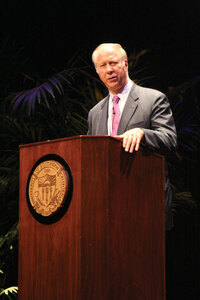David Gergen calls for focus on leadership
America is facing a crucial crisis of leadership that could alter the country’s future, acclaimed political expert David Gergen told students and faculty at Bovard Auditorium Thursday, calling on audience members to embrace their roles as decision-making citizens.
Gergen, who has been an adviser to four presidents and is currently the editor-at-large at US News & World Report and a political analyst at CNN, was speaking as part of The President’s Distinguished Artist And Lecture Series. After being introduced by USC President Steven B. Sample, Gergen spoke to the audience about the impending restructuring of global dynamics.

Into the future · David Gergen, who held positions in the Reagan, Nixon, Ford and Clinton administrations, spoke Thursday about America’s crisis of leadership and its potential impact. - Carlo Acenas | Daily Trojan
“The issue for us is, when the great nations of the world are sitting around the power tables 25 years from now — China will be there, India will be there, Japan could be there — will America be there? Will we be at the head of the table?” Gergen said.
Referencing influential historical figures from Winston Churchill to Franklin D. Roosevelt, Gergen told the audience about the importance of determined leadership and how strong personalities can shape the future of an organization, whether university or a nation.
“Individuals matter. Leadership matters and the quality of the leadership is the ‘X-factor’ in so many organizations,” Gergen said. “We need to think about that as a society, as we think about where this nation is going.”
As a political expert who has lived through 10 elections, Gergen said he had seen the country through a number of ups and downs, and understood the irrational fear that many in the United States felt after the economic crash. But, Gergen added, the relative improvement since last year doesn’t mean the country is already on the right track.
“We are no longer heading over the cliff,” he said. “[But] that does not mean we’re going to return to the way it was before.”
Speaking about conversations he had with analysts both at his television job and as a professor at Harvard’s John F. Kennedy School of Government, Gergen said America would have to focus on tackling its biggest issues over the next few years, rather than leaving the problems for future generations.
“We haven’t had the kind of leadership we need to build a sturdy future,” Gergen said. “The truth is we haven’t faced up to our biggest problems.”
Specifically naming education, health care and energy as the most crucial issues of the time, Gergen said a large part of dealing with these issues would fall on the shoulders of President Obama, who won last year’s vote on a campaign of hope and promise.
“Doubts are setting in about whether he is this great president that we all thought he was,” Gergen said. “He is having a hard time making the transition from campaigner to chief executive.”
Gergen said Obama’s need to split the difference rather than take a stand on every polarizing issue, from health care to Afghanistan, could affect his ability to succeed as a president as well as set the tone for the nation in the 21st century.
“There are areas in public life where you have to make a tough decision, where you have to get it done. There are times where you have to lead from the front,” Gergen said. “Time is not our friend now.”
Many members in the audience said they were impressed by Gergen’s speech and appreciated his nuanced comments about leadership in the United States.
“I thought he was incredible … especially his insight into the intellect of a leader,” said Walter Ponce, 27, a resident of Los Angeles. “It was also interesting that he hinted at the malaise settling into the country after the past few years of, what I call American imperialism.”
Katey Finnegan, a sophomore majoring in international relations, said she felt Gergen’s comments about the president were very fair, even though he was coming from a different point of view.
“It was interesting, I liked how he noted what he liked about Obama, and also gave constructive criticism,” Finnegan said. “I also think it was very important that our leaders have to go beyond just doing their jobs and encourage others to lead.”
In concluding his speech, Gergen underscored what he felt was the importance of leadership for the country, by insisting that tough decisions don’t only fall to the people in power, in boardrooms or in the media.
“To leave it on the president is not enough,” Gergen said. “Our future rests incredibly on the quality of our citizenship, those who are not in the White House, those not in the studios. This is a bottom-up society.”

He has always been a trader
Didn’t Gergen also and more importantly say that if we continue down our present path that the standard of living of our grandchildren will decrease by 25%?